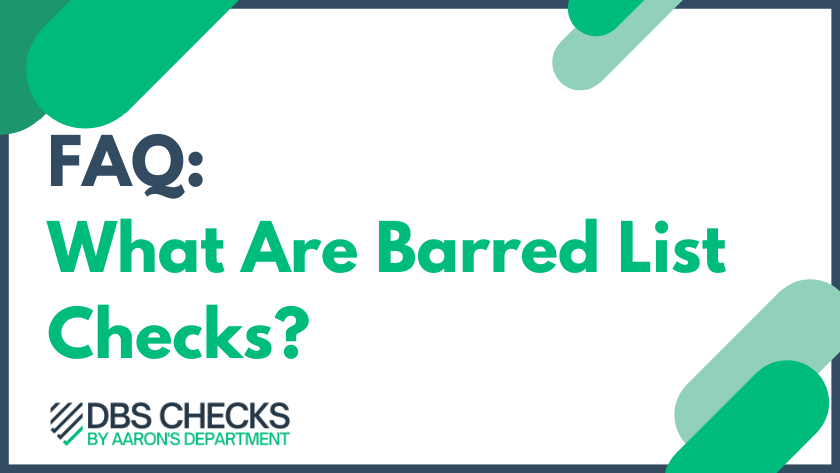Introduction – What Are Barred List Checks?
The Barred List checks play a crucial role in safeguarding, and are an integral part of the DBS (Disclosure and Barring Service) application process.
They act as a safety net for organisations working with vulnerable groups, particularly children and Vulnerable Adults. In essence, these checks screen potential employees against government-maintained databases to identify individuals who have been deemed unfit to work with these populations due to past offences or concerning behaviours. By incorporating Barred List checks into their recruitment practices, organisations can significantly reduce the risk of harm to vulnerable individuals and demonstrate their commitment to upholding the highest safety standards.
But what are Barred List checks, and who needs them?
What Are Barred List Checks? – Understanding Barred List Checks
The DBS maintains two separate Barred lists: One for individuals prohibited from working with Children and another for those barred from working with Vulnerable Adults. These lists are commonly known as the Children and Adults’ Barred Lists.
A Barred List check is a straightforward process involving a check against one or both of these lists to determine whether an individual is barred from working with either of these vulnerable groups.


What Are Barred List Checks? – Inclusion on the Barred Lists
Individuals can find themselves on these lists either due to committing a serious crime, which automatically triggers placement onto one or both of these lists, known as automatic barring offences, or if they are referred by an organisation for behaviour that poses a risk to children or Vulnerable Adults.
Organisations where Regulated Activity with these groups takes place have a legal duty to report such behaviour to the DBS, which will then assess and decide whether to include the individual on one or both of the barred lists.
What Are Barred List Checks? – Eligibility
Much like a DBS check, individuals must meet certain eligibility criteria for their employer to request a Barred List check.
To be eligible for a Barred List check, individuals must be engaged in regulated activity involving either children or Vulnerable Adults. For those working with children, eligibility can be determined by the nature of their work or the setting they work in, such as a school, nursery, or children’s home.
When working with Vulnerable Adults, regulated activity is determined by the activity itself, such as providing personal or health care.
For more information on how regulated activity is defined, we have our informative article: What is regulated activity?


Requesting a Barred List Check
Requesting a Barred List check is essential when employing staff who carry out regulated activities. Employers completing the DBS application form should indicate whether their applicant will be engaged in regulated activity with children, Vulnerable Adults, or both. This ensures that the appropriate Barred List check will be conducted as part of the application process.


Summary – What Are Barred List Checks?
In summary, a Barred List check involves verifying whether an individual is barred from working with either children or Vulnerable Adults by checking against the respective barred lists.
These checks are essential parts of safeguarding measures that organisations must adhere to when working with these vulnerable groups.
Forward someone this article!
Related Content
If you have found our article, “What Are Barred List Checks?” helpful, you may want to read some of our other related content on Barred Lists below.
What Gets You On The Barred List?
A Guide To The DBS Barred List
I Live With Someone On The DBS Barred List
About The Author


Kellie Dawson
Kellie is our in-house legal expert when it comes to DBS checks. With a background in the legal sector, she has become a recognised authority in this area.
